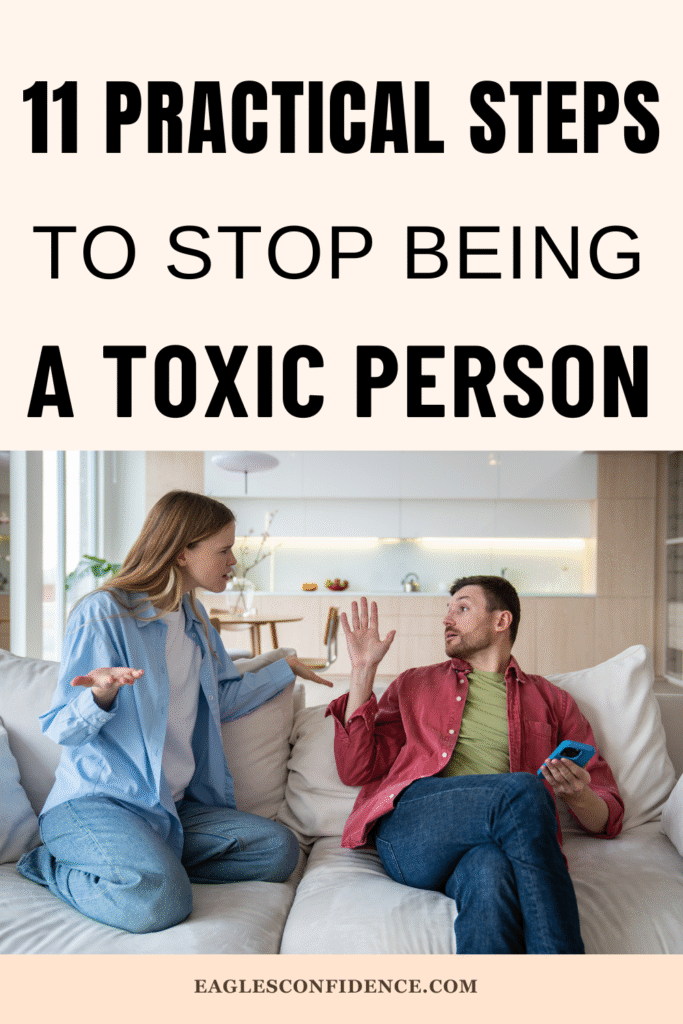Toxic behavior refers to actions, attitudes, or patterns of behavior that are harmful or detrimental to oneself and others. It can include a wide range of negative behaviors, such as manipulation, dishonesty, chronic negativity, lack of accountability, and more. Recognizing and addressing toxic behavior in ourselves is an essential part of ethical development and relationship building.
Awareness of toxic behavior in ourselves is the first step toward personal growth and change. By acknowledging our negative patterns of behavior, we can take responsibility for our actions and work towards healthier and more constructive ways of interacting with others.
The impact of toxic behavior can be significant, affecting relationships, emotional well-being, and overall happiness. Toxic behavior can lead to strained relationships, increased conflict, and a general sense of unhappiness and dissatisfaction.
If you are toxic, you are likely to push away friends, family, and colleagues with your negative behavior. Over time, this can lead to a cycle of isolation and negativity that can be difficult to break.
The consequences of toxic behavior can also extend beyond our personal lives and relationships. Toxic behavior can also have a negative impact on our mental health, leading to issues such as anxiety, depression, and low self-esteem.
Learning how to stop being a toxic person is a critical step in improving our quality of life and the lives of those around us. By developing a more positive and constructive mindset and focusing on healthy and supportive ways of interacting with others, we can break the cycle of toxicity and build healthier and happier lives for ourselves and others.
How To Stop Being a Toxic Person
1. Self-Reflection
To improve yourself when you recognize toxic behavior within you requires confronting your own actions through sincere self-assessment and reflection. Find a quiet and comfortable place where you can be alone with your thoughts, maybe even take a notebook and pen and write things down.
Reflect on your recent interactions, the things that have made you feel uncomfortable or guilty. Ask yourself questions such as, “What did I do?” “How did they respond?” “How was I feeling in that moment?” Write these things down and try to look for patterns. This will help you to identify the toxic traits you may be hiding from.
It is important to be as honest with yourself as possible, avoid making excuses or blaming others. This will be difficult, but self-reflection is not about making yourself feel better; it is about being truthful with yourself and acknowledging those traits of toxicity that you display in your life. It may also be a good idea to ask someone close to you, a friend or family member, to be honest with you about how they feel around you and what they think you could work on.
2. Acknowledgment of Hurtful Patterns
The first step in trying to be less toxic is to understand the impact of your actions on others. Toxic behavior can come in many forms, including manipulation, gossiping, and chronic negativity. Reflect on whether you are guilty of any of these hurtful patterns. Do you try to control conversations or situations to get your way, that is toxic manipulation. This can make others feel disrespected and manipulated.
Sharing other people’s secrets or speaking ill of them behind their backs is another form of toxicity, it can damage trust, especially when you are privy to information that someone has shared in confidence. Constant negativity also creates a toxic atmosphere that can bring others down with you and push people away.
Pay attention to your words and actions, are you always negative or do you find yourself spreading other people’s secrets? Once you can identify these hurtful patterns in yourself, you can start to break the cycle and be a more positive person.

3. Understand Triggers
If you want to start breaking the cycle of toxicity in your life you need to know what your triggers are. Reflect on the situations, emotions or people that cause you to act a certain way. It could be stress, insecurity or specific people that push your buttons. Practicing mindfulness through meditation or simply being more aware of your thoughts and feelings can help you identify these triggers.
Once you have a handle on your triggers you can start to work on them, if stress is a big trigger for you, try some deep breathing or meditation to help you manage your stress levels. If certain relationships in your life are toxic, it is okay to set boundaries with these people.
Be sure to let people know what you are working on so that you can avoid any misunderstandings and build better relationships.
Related: 16 Traits of Good People That Make a Difference
4. Take Responsibility
The next step in becoming a less toxic person is to take responsibility for your actions. Admit when you have messed up and try to understand how your actions have affected those around you. Own your mistakes and try to make amends. You can start to rebuild those relationships that you have damaged over time.
You will need to reflect on your past behavior and try to pinpoint those moments where you weren’t your best self, the cruel comments, the dismissive attitude, and manipulative tendencies. Try to put yourself in the shoes of the people around you and think about how your actions have made them feel.
When you apologize, make sure it is sincere and specific, do not simply say I am sorry and walk away. Acknowledge what you did wrong and let them know that you understand how it affected them. For example, I’m sorry I put down your accomplishments, I see now how much that must have hurt you.
Try to show people that you are serious about change through your actions. Keep your promises and ask for forgiveness. Demonstrate with your actions that you are making a sincere effort to be a better person. It will take time to repair the damage you have done, but it is possible if you are willing to put in the work.
5. Seek Professional Help
Sometimes self-reflection is not enough and you may need to seek professional help in order to make any real change. A therapist or counselor can help you to dig deep and explore the reasons why you act the way you do.
They can help you to identify the root cause of your behavior that you may have missed. A therapist will also be able to provide a safe and non-judgmental space for you to discuss your feelings and past experiences.
In therapy, you will learn healthier coping mechanisms and how to interact with others in a more positive way.
Therapy can also provide you with a sense of accountability, as you will have someone to check in with on a regular basis to ensure that you are staying on track with your goals. If you can find a therapist that specializes in anger management or conflict resolution, they will also be able to equip you with tools and strategies that you can use in your day to day life.
It is not a sign of weakness to ask for help, in fact it is quite the opposite.
6. Develop Empathy
As a toxic person who wants to change, you should also try to work on your empathy skills. Toxic behavior often stems from a lack of empathy for others. Try to listen more and be more aware of the people around you. Really listen to what people are saying and put your own thoughts and feelings on hold for a moment.
Pay attention to what they are saying and try to understand their perspective. Put a conscious effort into making eye contact, nodding when someone is talking and asking questions that encourage them to open up to you. This will help you to form a better connection with them and will also help you to understand where they are coming from.
You can also try to put yourself in other people’s shoes, if someone is upset, try to imagine what they must be going through. You can even keep a journal and write about your interactions with people, especially those difficult conversations.
Ask yourself how your words and actions affected them and what they may be feeling. This will help you to better understand others and also become more aware of how your behavior is having an impact on the people around you. Empathy is a skill that you will have to work on and practice, but it is worth it in the long run.

7. Improve Communication Skills
If you want to get rid of some of those toxic tendencies and have better relationships with the people around you, then you should also work on improving your communication skills. The first step is to try and be a better listener.
Listen more and really try to understand what people are trying to say to you. Do not just sit there waiting for your turn to speak. This will not only show the people in your life that you care, but it will also help to avoid any miscommunications. When you do speak, make sure that you communicate clearly and respectfully.
Avoid making generalizations or making assumptions about what the other person is thinking or feeling. Instead, use “I” statements to express your feelings without placing any blame on the other person. It is easier for people to hear what you have to say when you are not making them defensive.
You should also learn how to deal with arguments and disagreements in a more healthy way. Arguments are inevitable in life, but how you deal with them is what matters. Try and remain calm and take a step back, acknowledge how the other person is feeling and then focus on finding a solution rather than simply trying to win the argument.
You could even take a class or read a book on effective communication to help you hone in on these skills. The more you practice these skills the better you will become at it and the easier it will be for you to let go of those toxic patterns.
8. Deal With Past Trauma And Insecurities
As mentioned earlier, one of the most common reasons for toxic behavior is due to past trauma and deep-seated insecurities. It is important to acknowledge the source of your toxic behavior in order to work on becoming a better version of yourself. By reflecting on your past experiences you can start to see patterns of negativity that have been forming in your life.
Acknowledge these things and then you can start to work on healing. If you are able to forgive yourself and let go of these past traumas and insecurities then you will be able to start fresh.
9. Develop Healthy Coping Mechanisms
As well as trying to understand your triggers and root cause of your toxic behavior, you should also work on creating healthier coping strategies. Instead of turning to your usual bad habits, try and find some healthy alternatives.
Mindfulness practices such as meditation and journaling can help you to stay grounded and reflect on your feelings in a more constructive way. This can help you to approach difficult situations with a clearer head. Seeking help from a mental health professional can also provide you with some helpful techniques for coping with your triggers.
10. Set Boundaries
To have good relationships with people and let go of those toxic habits, you need to set some boundaries for yourself. Figure out what really gets under your skin and what tends to drain you. You then need to communicate your boundaries to others in a calm and clear way.
Use “I” statements to let them know how you are feeling, for example, instead of saying “you are always being so loud”, you can say, “I get stressed when there is a lot of noise”.
It is not just about saying no either, you also need to say yes to the things that you love and open yourself up to more healthy relationships.
People may not like you setting boundaries at first, especially if they are used to you being a certain way. Do not be swayed, being consistent with your boundaries will show people that you respect yourself and this in turn will make them respect you more as well.

11. Practice Positive Mindset and Behavior
If you want to stop being a toxic person, you should also make an effort to be a more positive person. This will not only make you a better person but it will also make you happier. Try and make a conscious effort to focus on the positive things in your life, even the little things can count.
Try and keep a gratitude journal and just write down the things that you are thankful for each day. This will train your brain to look for the positive rather than dwelling on the negative.
When you catch yourself thinking negative thoughts, try to reframe them in a more positive light. Instead of thinking “I am rubbish at this” try thinking “I am learning and getting better every day”. Surround yourself with positive people and you will start to absorb their good energy. It will take time and effort but all of those small positive changes will add up and you will become a much happier and healthier person.
How To Know If Someone Is a Toxic Person
1. Manipulation
Manipulative people like to control or influence someone else, often in a deceptive or indirect way. Manipulation can include twisting the truth, playing mind games, and guilt-tripping others to get what they want. This behavior can be toxic and hurtful to those around them.
2. Gaslighting
Gaslighting is a psychological behavior where a person manipulates another person to question their own reality, memory or perception of events. Gaslighters may use tactics such as lying, denying, and trivializing the other person’s feelings to gain control over the situation and make the other person doubt themselves.
Related: 9 Signs Of a Self-Centered Person
3. Constant Criticism
Constant criticism involves consistently pointing out the faults or mistakes of others in an unconstructive or mean-spirited way. Toxic people often criticize others to make themselves feel better or more powerful. This behavior can be very damaging to relationships and can leave the person on the receiving end feeling hurt, inadequate, and insecure.
Conclusion
Recognizing toxic behavior is essential to break the cycle of negativity and build healthier and happier relationships with others. Toxic behaviors can include manipulation, dishonesty, chronic negativity, and lack of accountability, among other things. The first step towards personal growth and change is being aware of our own toxic behaviors and taking responsibility for our actions.
The impact of toxic behavior on relationships and emotional well-being can be significant, often leading to increased conflict, strained relationships, and an overall sense of unhappiness and dissatisfaction. By taking responsibility for our actions and making amends, we can start to repair damaged relationships and build healthier ones.
Dealing with past traumas and insecurities, creating healthy coping mechanisms, and setting boundaries are other helpful strategies to stop being a toxic person. Practicing a positive mindset and behavior can also make a big difference in our lives and the lives of those around us.
By being aware of our own toxic behavior and working to change it, we can create a more positive and supportive environment for ourselves and those around us.
Save the pin for later

- 10 Signs of a Cheating Partner You Should Never Ignore - January 11, 2026
- 10 Effective Ways to Practice Gratitude - November 20, 2025
- 12 Everyday Habits That Can Diminish Your Memory Power - November 15, 2025




